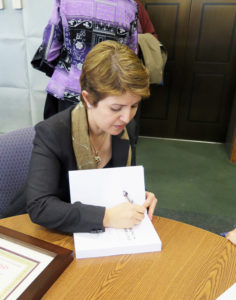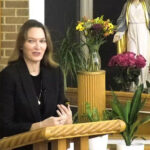By Barb Arland-Fye
The Catholic Messenger
Widad Akreyi was 8 years old, attending an all-girls school in northern Iraq, when a member of the ruling Ba’ath Party entered her classroom. He wanted all of the students to join the Ba’ath Party. She refused. “I said I didn’t want to join their party.” The shocked man instructed someone to write down her name. She will join the party, he said. But Widad again refused. “He became really, really angry. He used force against me,” Widad told a small group of students and professors at Augustana College in Rock Island, Ill.

Widad Akreyi signs a book following the Pacem in Terris Peace and Freedom Award ceremony Oct. 22 at St. Ambrose University in Davenport. The following day she spent time at Augustana College in Rock Island, Ill.
“I learned there is a price I have to pay if I’m to be involved in human rights,” observed Widad. She visited Augustana on Oct. 23, the day after receiving the Pacem in Terris Peace and Freedom Award on the St. Ambrose University campus in Davenport. Jason Mahn, an Augustana associate professor of religion, is part of the interfaith Pacem in Terris Coalition. He asked Widad to speak with his students.
“I was blacklisted at the age of 8,” she told the students. The experience was awful, “but I’m at peace with it,” she said. “I have forgiven everyone who has wronged me or used force against me. I will never allow myself to think badly of anyone.” She seeks to prevent anyone else from having to experience a similar “episode.”
“How do you make peace with that?” asked a student, who is having difficulties with her father. “Even when your dad is using power against you, you can’t push him back…. You have to make peace that he is standing there in front of you,” Widad said.
You can’t strive to make your point “until you are at peace” with that individual, she continued. Prayer plays an essential role in her ability to find peace. “I pray every day. I thank God for all of the things he has given me and for all of the things he has not given me. God has helped me through.” Widad, a medical researcher by profession, also meditates, listens to classical music and reviews medical articles. “Prayer, medical research and music are my way of making peace with (others).”
Her interest in medical research arose from her commitment to advocating for human rights and social justice. The 1987 Anfal genocide of the Kurds in Iraq had a profound impact on Widad, a Kurd who was in her late teens at the time. She grew more interested in trying to understand how the use of chemical weapons in that genocide impacted survivors physically and psychologically. “The prevalence of cancers among them was increasing dramatically,” said Widad, who earned a PhD in global health and cancer epidemiology. “I needed science to back me up, to help them.”
In addition to her concern for the treatment of religious and ethnic minorities in her homeland, Widad is also deeply troubled by the suffering of the Rohingya refugees fleeing Myanmar. “The international community must get involved,” she said. The government of Myanmar reportedly is not allowing aid to get to the Rohingya people. Widad wonders whether that is an attempt to starve them to death.
She said she wrote a letter to the government and to the president of Myanmar, Aung San Suu Kyi, who was the 1991 Nobel Peace Prize winner. No response has been received, Widad said. She also issued a statement Sept. 21 (International Peace Day) on her website, widad.org, calling for an end to the violation of human rights in Myanmar, North Korea, Egypt, Turkey, Iraq, Iran, Syria, Pakistan and by all who support ISIS.
Her statement reads: “We can work together to transform injustice into justice, fear into freedom, slavery into liberty, sorrow and stress into peace. Join us and stand up for human rights! Spread the message of peace among all peoples and nations… Today and every day, let us strengthen the ideals of peace and togetherness… Let us get together to promote peace, respect, safety and dignity for ALL.”
Professor Mahn asked Widad, “What can people like us do?”
Contact legislative leaders, urging them to inform international leaders of the public demand to stop human rights violations. Get involved in advocacy efforts at the local level. Students can mobilize by organizing demonstrations and slogan campaigns. Governments will listen, she said, when their constituents tell them, “We don’t want this to continue.”
Widad also advised, “Don’t underestimate the power of a story.” Stories and photos have a powerful impact on people, propelling them to want to do something about the suffering of others. Be prepared to volunteer, she added. “Help others without expecting anything.”











